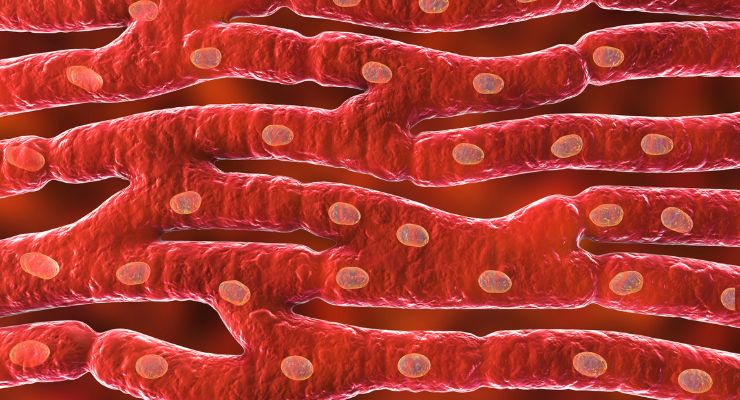12.14.23
A new study shows that Ubiqsome, an CoQ10 ingredient by supplier Indena which features its Phytosome food-grade liposomal delivery system, has better cellular uptake in muscle cells compared to a standard CoQ10 ingredient.
These findings are in line with a previous human clinical trial in which CoQ10 uptake, both using the Phytosome delivery platform and an un-formulated CoQ10, was measured in a group of 20 healthy, aging runners.
CoQ10 plays a central role in generation and regulation of cellular energy, and is involved in ATP production as it transfers electrons within the mitochondrial oxidative respiratory chain. CoQ10 has been evidenced to exhibit antioxidant effects, and is linked to a number of health benefits.
In general, CoQ10 has low oral bioavailability rates due to its poor water solubility, high molecular weight, low solubility in lipids, and low intestinal permeability.
Enhanced Cellular Uptake
In the present crossover study, eight volunteers were randomized to take a 100 mg CoQ10 supplement for two weeks, either in the Phytosome form or in CoQ10 crystalline form. After the treatment period ended, researchers collected plasma samples from the participants. Low-density lipoproteins were extracted, normalized for CoQ10 content, and incubated with two different cell lines for 24 hours, which found that the delivery platform enhanced CoQ10 bioavailability.
Ubiqsome showed a higher bioavailability compared to crystalline CoQ10 in the in-vitro portion of the study, both in dermal fibroblasts and myoblasts, suggesting that Phytosome might enhance delivery to skin and muscle tissues.
Ubiqsome, a CoQ10 featuring the proprietary phytosome delivery platform by Indena, makes the ingredient more reliable and customizable. It is standardizable to 18-22% CoQ10 content, as measured by high performance liquid chromatography (HPLC).
“We’re happy and proud of these new results from the study led by professor Tiano, which can confirm that our Ubiqsome is a great formulation of coenzyme Q10,” said Serena Tongiani, chief product officer at Indena. “They are added to the scientific data build for our product, starting from the multiple evidences which show enhanced plasmatic levels of coenzyme Q10 thanks to Ubiqsome. Moreover, this study demonstrated for the first time in humans that Ubiqsome optimizes muscle levels of CoQ10 after oral supplementation compared to baseline. Last, but not least, Ubiqsome has been recently demonstrated to enhance endothelial function already after the first dose in young healthy subjects, showing itself as an effective support to cardiovascular health and healthy aging even in the absence of any specific disease.”
In a 2021 in vitro study, researchers sought to determine why muscle cells absorbed the liposomal version of CoQ10 more readily than a standardized CoQ10 formulation. Using lecithin as a liposomal carrier, Phytosome significantly increased the number of intracellular lipid droplets, especially in cardiac cells, suggesting that both CoQ10 and lipids from Phytosome can be internalized as lipid aggregates.
CoQ10 also increased not just within the cell but within the mitochondria, leading to improved oxygen consumption, higher ATP and cell protein production, higher mitochondria biogenesis, and reduced oxidative stress.
These findings are in line with a previous human clinical trial in which CoQ10 uptake, both using the Phytosome delivery platform and an un-formulated CoQ10, was measured in a group of 20 healthy, aging runners.
CoQ10 plays a central role in generation and regulation of cellular energy, and is involved in ATP production as it transfers electrons within the mitochondrial oxidative respiratory chain. CoQ10 has been evidenced to exhibit antioxidant effects, and is linked to a number of health benefits.
In general, CoQ10 has low oral bioavailability rates due to its poor water solubility, high molecular weight, low solubility in lipids, and low intestinal permeability.
Enhanced Cellular Uptake
In the present crossover study, eight volunteers were randomized to take a 100 mg CoQ10 supplement for two weeks, either in the Phytosome form or in CoQ10 crystalline form. After the treatment period ended, researchers collected plasma samples from the participants. Low-density lipoproteins were extracted, normalized for CoQ10 content, and incubated with two different cell lines for 24 hours, which found that the delivery platform enhanced CoQ10 bioavailability.
Ubiqsome showed a higher bioavailability compared to crystalline CoQ10 in the in-vitro portion of the study, both in dermal fibroblasts and myoblasts, suggesting that Phytosome might enhance delivery to skin and muscle tissues.
Ubiqsome, a CoQ10 featuring the proprietary phytosome delivery platform by Indena, makes the ingredient more reliable and customizable. It is standardizable to 18-22% CoQ10 content, as measured by high performance liquid chromatography (HPLC).
“We’re happy and proud of these new results from the study led by professor Tiano, which can confirm that our Ubiqsome is a great formulation of coenzyme Q10,” said Serena Tongiani, chief product officer at Indena. “They are added to the scientific data build for our product, starting from the multiple evidences which show enhanced plasmatic levels of coenzyme Q10 thanks to Ubiqsome. Moreover, this study demonstrated for the first time in humans that Ubiqsome optimizes muscle levels of CoQ10 after oral supplementation compared to baseline. Last, but not least, Ubiqsome has been recently demonstrated to enhance endothelial function already after the first dose in young healthy subjects, showing itself as an effective support to cardiovascular health and healthy aging even in the absence of any specific disease.”
In a 2021 in vitro study, researchers sought to determine why muscle cells absorbed the liposomal version of CoQ10 more readily than a standardized CoQ10 formulation. Using lecithin as a liposomal carrier, Phytosome significantly increased the number of intracellular lipid droplets, especially in cardiac cells, suggesting that both CoQ10 and lipids from Phytosome can be internalized as lipid aggregates.
CoQ10 also increased not just within the cell but within the mitochondria, leading to improved oxygen consumption, higher ATP and cell protein production, higher mitochondria biogenesis, and reduced oxidative stress.




























